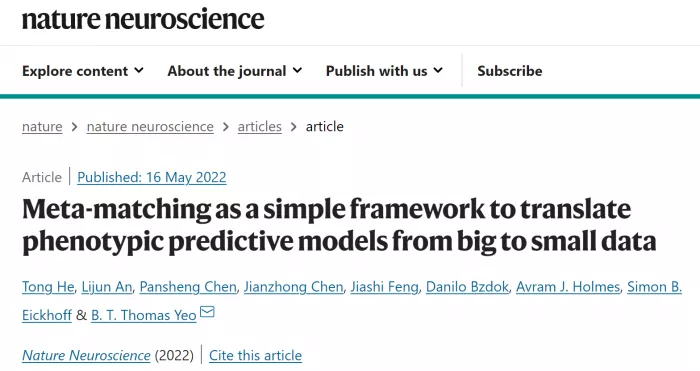It was reported on May 19 that recently, a technical achievement cooperated by the National University of Singapore and other institutions was published on the top journal Nature Neuroscience of neurobiology. This study introduces the meta learning method in the field of artificial intelligence into the field of neuroscience and medicine for the first time, which can train a reliable AI model on limited medical data and improve the effect of precision medicine based on brain imaging.

Brain imaging technology is an important field of the development of neuroscience. It can directly observe the neurochemical changes of the brain in information processing and response to stimuli, so as to provide an important reference for the diagnosis and treatment of diseases. Theoretically, AI model based on brain imaging can be applied to predict some characterization characteristics of individuals, such as IQ, clinical effect of a drug or a treatment, so as to promote precision medical treatment for individuals and improve the medical and nursing level of society.
A practical problem is that although there are large-scale human neuroscience data sets such as UK Biobank, small-scale data samples of dozens to hundreds of people are still normal when studying clinical populations or solving key neuroscience problems. When the amount of accurately labeled medical data is limited, how to train a reliable AI model is becoming a focus issue in the fields of neuroscience and computer science.
In the latest research results released by nature neuroscience, researchers from the National University of Singapore, byte beating, McGill University and other institutions proposed for the first time to use meta learning in the field of machine learning to solve the above problems. Meta learning is a method for machines to learn better. The purpose is to make machines better use of the "knowledge" acquired in previous tasks when facing new tasks.
Through the analysis of previous small sample data, researchers found that there is an internal correlation between individual cognitive, mental health, demographic and other health attributes and brain imaging data. Based on the correlation between small sample data and large data sets, researchers propose a method called meta matching. This method can transfer the machine learning model trained on large data set to small data set, so as to train a more reliable model to predict the new phenotype more accurately.
This new method has been evaluated on the data sets of UK Biobank and human connectome project. The evaluation results show that the new method shows higher accuracy than the traditional method.
Experiments show that this new training framework is very flexible and can be combined with any machine learning algorithm. It can also effectively train AI prediction models with good generalization performance on small-scale data sets.
Nature Neuroscience is a subsidiary of nature, the world's most influential academic journal, and one of the top journals in the field of neurobiology. The papers published in the journal cover various fields of neuroscience, including molecular, cell, system, behavior, cognition and computing research.